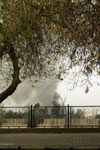 Los Angeles Times: The nighttime attack targets a cafe popular with Shiite Kurds and may have been aimed at escalating religious and ethnic tensions in restive Diyala.
Los Angeles Times: The nighttime attack targets a cafe popular with Shiite Kurds and may have been aimed at escalating religious and ethnic tensions in restive Diyala.
The Los Angeles Times
The nighttime attack targets a cafe popular with Shiite Kurds and may have been aimed at escalating religious and ethnic tensions in restive Diyala.
By Ned Parker, Los Angeles Times
 Reporting from Baghdad — A suicide bomber killed at least 25 people and wounded 70 others Friday in Diyala province, a troubled region northeast of Baghdad. The nighttime explosion tore through a crowded cafe frequented by Shiite Kurds. Rescuers had to sift through rubble in search of survivors, said witnesses and a police officer who provided the casualty figures.
Reporting from Baghdad — A suicide bomber killed at least 25 people and wounded 70 others Friday in Diyala province, a troubled region northeast of Baghdad. The nighttime explosion tore through a crowded cafe frequented by Shiite Kurds. Rescuers had to sift through rubble in search of survivors, said witnesses and a police officer who provided the casualty figures.
The attack bore the hallmarks of the militant group Al Qaeda in Iraq. Its probable intent was to escalate frictions in the province, with its mix of Shiite Arabs, Sunni Arabs and Shiite and Sunni Kurds. The bombing was the first major suicide attack in Iraq since mid-September, when three car bombs killed 33 people in Baghdad and the western province of Anbar.
People had been shooting pool in the cafe in the eastern town of Balad Ruz, midway between Diyala’s capital, Baqubah, and the Iranian border, when the attacker set off his bomb. The building collapsed, and civil defense teams rushed to dig victims out, police 2nd Lt. Ali Rubaie said.
Along with the rest of the neighborhood, the cafe was built after Shiite Kurds fled to Balad Ruz from the Iranian border at the beginning of the Iran-Iraq war in 1980. The cafe was the one place in the district where people could go to play pool or dominos, smoke water pipes and drink tea.
“I saw people rushing outside the cafe. Some were injured, at least one had lost an arm. Some had no clothes. Others fell down. There was a mixture of blood, dust and smoke,” said Ali Ismail Kadhim, who works nearby.
He described a giant fireball rising from the cafe, which had a roof made partly from date palm fronds. The smell of burned leaves, fire and charred bodies filled the air; victims lay on the ground as the security forces sealed off the area, Kadhim said. People loaded many of the wounded onto horse-drawn carts to be taken for treatment, he added.
Diyala has been a tinderbox for the country’s tensions because of its combustible ethnic and religious mosaic. The region was a stronghold for Al Qaeda in Iraq, and the Shiite-led national government has been suspicious of the province’s Sunni majority as a result. In turn, the Sunnis believe the powers in Baghdad have sought to arrest their community leaders and harass them.
Northern Diyala has also been riven by the competition among Arabs and Kurds for control of areas adjoining Iraq’s semiautonomous Kurdish region.
In early September, officials and community leaders in Diyala, Baghdad and western Iraq warned The Times that Al Qaeda in Iraq was regaining strength. They said the extremist group was taking advantage of the dwindling of the Awakening movement, the Sunni paramilitary group whose members had quit their posts or in some cases been intimidated or recruited back to Al Qaeda in Iraq because of poor treatment by the government.
The attack in Diyala occurred amid national political gridlock, with the country unable to form a new government nearly eight months after nationwide elections. Government officials, security officers and community leaders are killed almost daily, either by mysterious gunmen with silencers or by assailants who stick bombs onto their target’s car.
As politicians haggle over power in the next government, all sides suspect the worst of one another, haunted by their memories of the country’s recent sectarian war as well as the legacy of the late dictator Saddam Hussein’s rule.
The public, meanwhile, is disillusioned with its political leaders, who are seen as corrupt and driven by self interest.
Major political blocs are scheduled to start roundtable talks soon to break the stalemate, but some believe that it is too late for a government to be formed this year. The possibility has been raised, however slight, that the current limbo could last past the first anniversary of national elections in March.
Times staff writer Raheem Salman in The Times’ Baghdad Bureau and special correspondent Faris Mehdawi contributed to this report.


